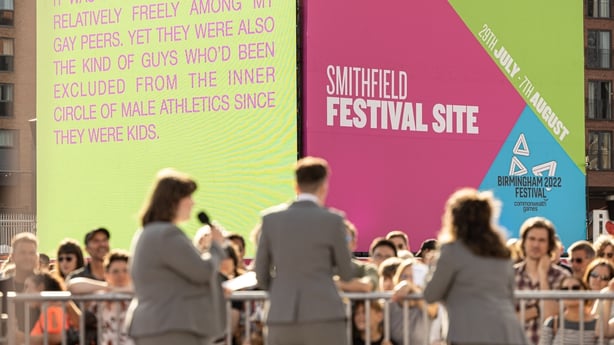Musicologist, writer and critic Liam Cagney reports on a unique musical project fusing sport and music, created by composers Michael Wolters and Seán Clancy for this year’s UK Commonwealth Games.
When the Birmingham 2022 Commonwealth Games opened a call for artistic proposals, composer Michael Wolters saw it as an opportunity to highlight that homosexuality is still illegal in 35 commonwealth countries. Wolters teamed up with his Royal Birmingham Conservatoire colleague, the Irish composer Seán Clancy, to create a work centred on psychologist (and ex-NBA player) John Amaechi, the first professional basketball player to come out as gay.
Their resulting composition Amaechi premiered to acclaim at the Commonwealth Games, and recently a video of it appeared online.
We need your consent to load this YouTube contentWe use YouTube to manage extra content that can set cookies on your device and collect data about your activity. Please review their details and accept them to load the content.Manage Preferences[embedded content]
Amaechi is a beautiful, celebratory work. It is also unconventional: scored not only for musicians but for basketball players, and performed not in a concert hall but on a basketball court. In each of its ten short songs, three singers in close harmony recite text from John Amaechi recounting his experience as a gay professional athlete. At other times, conga percussion, chiming triangles, drumkit and synthesizer follow precise score instructions responding to athletes doing drills. It’s a lively spectacle for the eyes and ears.
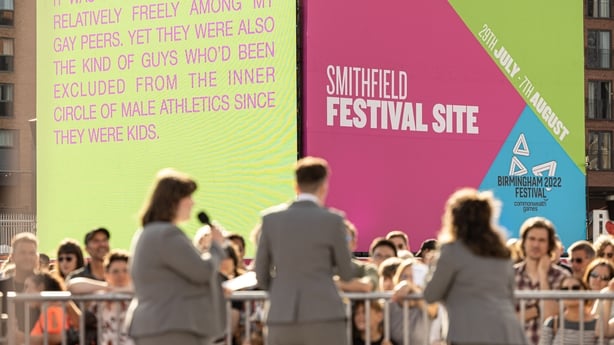
Amaechi’s statements are powerful. Upon learning of Amaechi’s homosexuality, ex-team mate and NBA All Star Tim Hardaway responded that he wouldn’t want any gay players in the dressing room. In the fourth song, Amaechi’s words address the anxiety he felt lest anyone should suspect him of being gay. ‘I was taking a significant risk in allowing even the guessing game,’ sing the trio, ‘and it’s precisely that kind of concern that makes it so hard for gay athletes or even their straight supporters to speak up in any context, public or private.’
Singing alternates with sporting-drill interludes. Basketball players shoot hoops, do layups and play one-on-one, showing us Amaechi’s metier, to at times dreamy accompaniment by the electronic musician and percussionists.
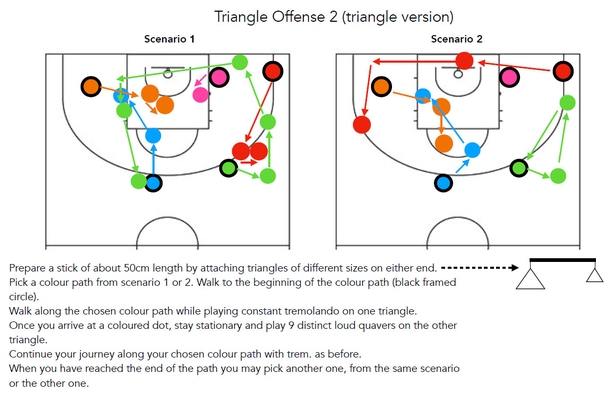
“During the performances at the Commonwealth Games, it was incredibly beautiful to see the response of the LGBTQ+ community in Birmingham,” Clancy says, “and indeed from some Commonwealth Games athletes, whom it seemed this piece was giving voice to”.
The composers had Amaechi’s backing from the start. They “met him to speak about the mechanics of the piece,” Clancy says, “even how it would look and sound. He gave us his full support, and we were given copies of his books Man in the Middle (2008) and Promises of Giants (2021)”.
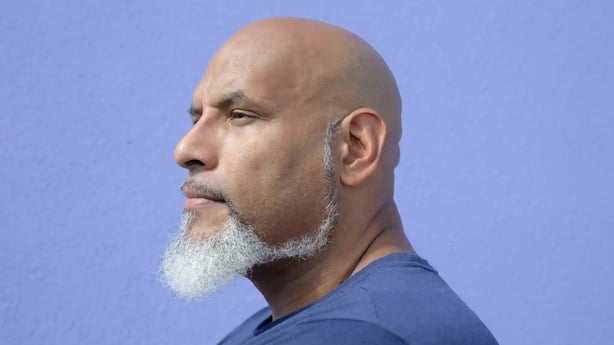
Amaechi’s reflections help straight audiences appreciate the internal conflict gay athletes can feel between different aspects of their identity. In the sixth song, Amaechi’s words tell of how, for him, homophobia is a behavioural response. “I became convinced that anti-gay prejudice is more a convention of a particular brand of masculinity than a genuine prejudice”. He compares it to “donning your game face” — by which he skewers homophobia’s legitimacy and suggests that, as one defeats an opponent through skill and training and mindset, one can similarly move beyond homophobia.
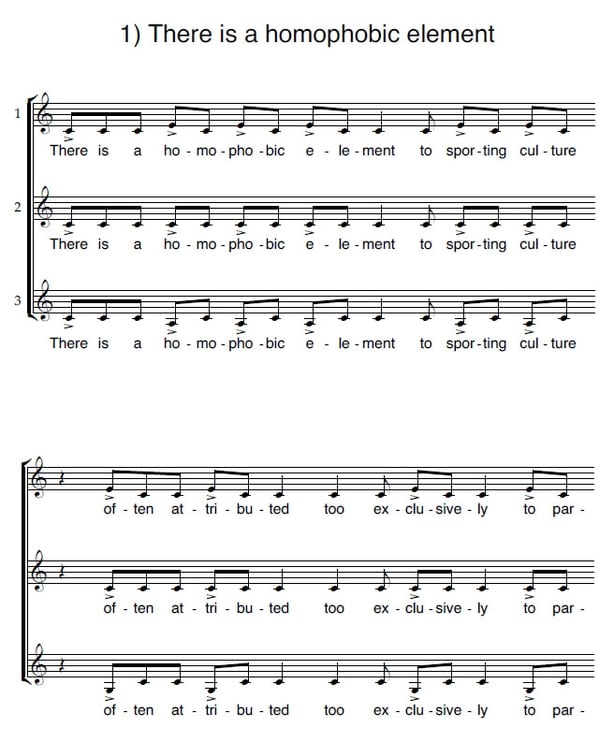
“Music and sport are incredibly closely linked for me,” Clancy says, whose previous compositions include Forty-five Minutes of Music on the Subject of Football (structured around the Ireland vs Italy game in USA ‘94) and This is About, co-written with Andy Ingamells (which features hurling). Clancy underlines the similarities between music and sport: “They are both durational, they are movement; they are community-based and social practices that enable us to play with and/or for other people”. Both can have problems, but “for the most part they are what bring people together, and particularly in troubled times (as we have seen in recent years) they are the two things that people turn to first”.
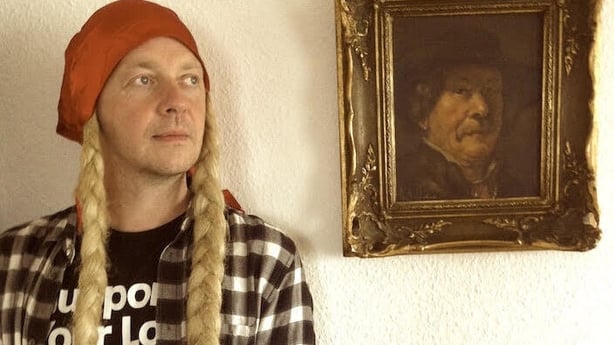
Wolters as a gay man relates directly to much of what Amaechi addresses. He also links this to taking musical performance outside the concert hall. “As a queer person who is engaged in contemporary music making, I have always found the tradition and rituals of a concert hall oppressive,” he says, though at the same time he takes pains to distinguish classical music itself from the concert hall setting.
Neither Wolters nor Clancy think music always has to be overtly political. “It can be about pure self-expression, asking questions or simply facilitating experiences of any kind,” Wolters says. “However, when what I do is funded with public money, I do think that I have a responsibility as an artist to contribute to society in some way. For me this means asking questions, offering alternatives, creating something that goes beyond (but can definitely include) entertainment.”
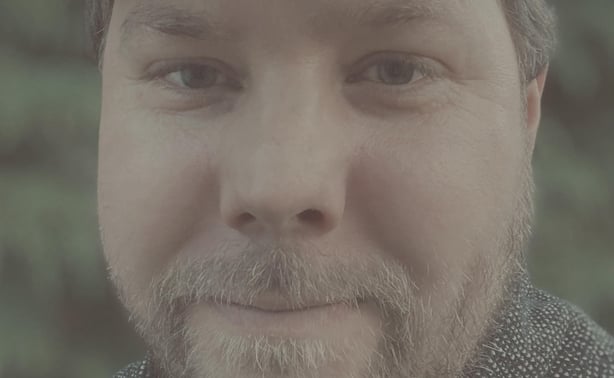
The seventh song addresses FIFA’s hypocrisy—claiming to protect queer athletes yet awarding World Cup hosting to Qatar, a country where homosexuality is punishable by death. The continued illegality of homosexuality in commonwealth countries, Wolters notes, is risible. “I mean, it’s 2022 and people are still being killed just because they love someone who is the same sex as them—that’s insane! I have to do something”.
Amaechi’s penultimate song distinguishes inclusion from diversity. Diversity is the state we want to arrive at; inclusion is how we get there, “rooted in everyday choices that are made anew daily”. They are affirmative, inspiring words, giving the audience something to take back into the world when the whistle blows for full time and this energetic, poignant work is over.

